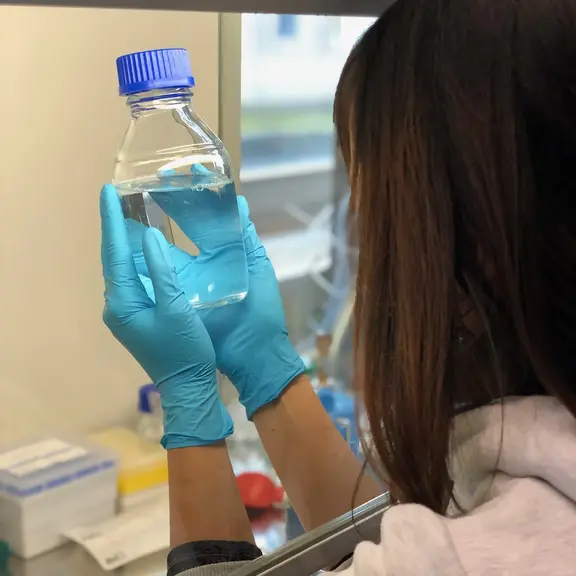I did my Bachelor in Biotechnology in Indonesia and Master study in Food Microbiology and Biotechnology at the Unviersity of Hohenheim in Stuttgart. For my Master Thesis I worked intensively in molecular biology, microbiology field as well as enzyme technology, which also became my personal interest afterwards. Then, I got an opportunity to widen my knowledge in bioprocess engineering field for my PhD, where I focus on the optimization of bioreactor cultivation of fungi. Having natural science as background it was pretty challenging in the beginning for me to enter a new field. But with the support I got from my colleagues since the beginning of my PhD, I can overcome it and get settled in this new field. So far, my plan after PhD is to go to Pharmaceutical Industry as scientist. But let`s see what life has in store for me :)

Protease inhibitor produced by Penicillium sp. (IBWF 040-09) is a potential cure for African sleeping sickness (Human African Trypanosomiasis) caused by Trypanosoma brucei transmitted by the bite of Tsetse fly. One essential protease enzyme of T. brucei for its survival is rhodesain, which is proven to be inhibited by the inhibitor produced by Penicillium sp. (IBWF 040-09). The advantage of treatment using this inhibitor is that side effects can be minimized in comparison to other chemical-synthetic drugs.
The main focus of my study is to find the optimum condition of the fermentation process for the production of protease inhibitor. The composition of the medium for the fermentation is varied as well as the spore inoculum for starting the fermentation. The goal is to find any trend from these variations and pick one best condition for the production of the protease inhibitor.
I normally start the bioreactor fermentation on Friday. The fungi need up to 48 h to go through their lag phase until they form pellets. Therefore, I can enjoy the weekend without the need to take samples. As soon as the pellets are formed, I will take samples every 8 hour a day. After the fermentation is finished, the fungal biomass will be harvested. The extraction process will take place until the extract of protease inhibitor is obtained. In order to prove the production of protease inhibitor in every fermentation, an assay is performed by reacting the protease inhibitor against rhodesain enzyme. If protease inhibitor is produced, the rhodesain will be inhibited and no product can be detected from the reaction; on the other hand, if the inhibitor activity is low, the rhodesain can still react with the substrate and produce a fluorescence substance as product. The production of protease inhibitor is presumably influenced by the fungal pellet morphology. Thus, the pellet morphology is also investigated in my study. The pellets are in Paraffin embedded and then 20 µm thin-sliced using Microtome. The internal structure of the pellets is observed using microscope.
The growth curve of the fungi in every fermentation, metabolic activity depicted on the pH-course during the fermentation, analysis of the pellet morphology as well as protease inhibitor activity are compared between the fermentations.
Applicability of a single-use bioreactor compared to a glass bioreactor for the fermentation of filamentous fungi and evaluation of the reproducibility of growth in pellet form, DOI: 10.1002/elsc.202000069
Novel bioreactor internals for the cultivation of spore-forming fungi in pellet form, DOI: 10.1002/elsc.202100094
You are leaving the official website of Trier University of Applied Sciences